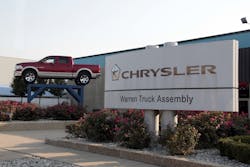Redesigned Ram assembly line to build 28,500 additional trucks
Changes to the Chrysler Group’s Warren Truck Assembly Plant will enable the company to manufacturer an average of 100 more Ram trucks per day.
To achieve this increased capacity, the company redesigned 353 work stations. The changes enable 76-year old plant to turn out five more trucks an hour. Implementation of these changes also help improv safety, productivity and quality.
The company’s UAW-represented employees submitting nearly 7,000 suggestions. A critical aspect of preparing the plant for the new run rate was the establishment of a Work Place Integration (WPI) process. As part of WPI, every operation in every workstation was reviewed, best practices evaluated and processes verified before a single vehicle was built, all while integrating the World Class Manufacturing (WCM) methodology with a focus on improving safety, logistics and quality.
The goal of WCM is to reduce waste, increase productivity, and improve quality and safety in a systematic and organized way. WCM engages the workforce to provide and implement suggestions on how to improve their jobs and their plants. WCM was first implemented by Fiat in 2006 and introduced to Chrysler Group as part of the alliance between the two companies in June 2009.
With the guiding principles of WCM and the use of the WPI room, Warren Truck UAW-represented team leaders and operators redesigned more than 353 work stations – or nearly all of the work stations in the assembly process; identified and corrected more than 100 issues that could cause injury; and moved nearly 300 parts to provide better ergonomics and build processes for the employees. Nearly all of the operators in assembly – about 63 percent of the plant population – were trained on the new processes, generating nearly 7,000 additional suggestions on how to improve the efficiency of the line.
As a result of the redesign carried out using the WPI process, material and parts that were once located line side are now gathered into kits or carriers, also known as limos. Two areas – the chassis frame line and the Motorhouse line – benefitted from the integration of limos and kits.
On the chassis frame line, limos attach to the truck frame as it moves down the line, positioning larger and heavier parts, like front and rear shocks, springs and lower control arms, in the optimal location – or the “Golden Zone,” the area immediately in front of the operator – for installation, improving the ergonomics for the operator. Limos also reduce the time spent walking to retrieve parts or tools, enabling the team to use that savings to achieve the increased production target of five additional trucks built per hour or 100 trucks per day. The easy accessibility of parts in a kit also allows operators to focus more on the proper installation of the part, thereby improving the quality of the product.
In the Motorhouse, where the engine assembly is completed before being mated to the chassis, the Warren Truck team had to figure out a way to manage the complexity of building three different engines – the 3.6-liter Pentastar V-6, 5.7-liter HEMI® V-8 and the 3.0-liter V-6 EcoDiesel with over 170 unique parts and nearly 70 parts that look and feel the same, but are very different – on the same line efficiently and correctly. The answer was to kit the parts and put the kit right in the truck, which reduces waste in the form of walking, a non-value-added activity. When there are several variations in an operation, like the Motorhouse line, kitting also helps error proof the process by taking decision-making away from the operator.
“The employees actually like the kits,” said Towne. “They like the fact that they don’t have to walk as far to grab their parts, which is a waste. That’s time that could be spent building a truck. Plus, at the end of a 10-hour day, they’re not as tired as they once were.”
Warren Truck Assembly Plant has built more than 13 million trucks since 1938, including the current Ram 1500 which won back-to-back Motor Trend Truck of the Year awards in 2013 and 2014. The plant currently employs more than 3,800, working four 10-hour days on two shifts six days per week. In 2013, the Warren Truck Assembly Plant built 291,554 Ram Trucks, up from 227,453 in 2012.
